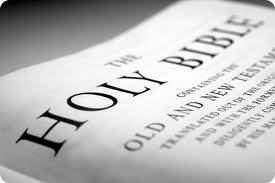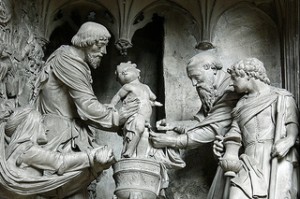====================
This sermon was preached on Sunday, June 3, 2012, at St. Paul’s Episcopal Church, Medina, Ohio, where Fr. Funston is rector. (Revised Common Lectionary Readings for Trinity Sunday, Year B: Isaiah 6:1-8; Canticle 13 [BCP 1979, Page 90]; Romans 8:12-17; and John 3:1-17.)
====================
 Did you listen carefully or perhaps even follow along in the Prayer Book when I offered our opening prayer today, the Collect for Trinity Sunday? Listen to it again:
Did you listen carefully or perhaps even follow along in the Prayer Book when I offered our opening prayer today, the Collect for Trinity Sunday? Listen to it again:
Almighty and everlasting God, you have given to us your servants grace, by the confession of a true faith, to acknowledge the glory of the eternal Trinity, and in the power of your divine Majesty to worship the Unity….
Did that make any sense to you? If not, don’t feel bad. It doesn’t make sense to a lot of people and, frankly, I don’t think it’s supposed to make sense.
Today is different from all other days in the liturgical calendar. Nearly all of our other special feast days commemorate events in the life of Jesus or events in the early history of the church or the lives of special saints, but this day, this one peculiar day, we celebrate a doctrine: the Doctrine of the Trinity. It is a day which, after many years in ordained ministry, many years preaching through the liturgical lectionary, I’ve come to realize strikes terror in the hearts of many clergy. Every year we face the same dilemma: how do we make the Doctrine of the Trinity understandable?
You know that in my sermon preparation one of the things I do is consult with other clergy. I talk with my local colleagues in bible study; I “chat” with clergy friends on the internet; I read commentaries, articles, and essays by other clergy and theologians. On one of the blogs I read pretty regularly, a Lutheran pastor summarized the Doctrine of the Trinity this way:
So let’s get right down to it, shall we? Here we go: God is 3 persons and one being. God is one and yet three. The father is not the son or the Spirit, the son is not the father or the Spirit, the spirit is not the Father or the Son. But the Father Son and Spirit all are God and God is one. …so to review. 1+1+1=1. That’s simple enough. (The Rev. Nadia Bolz Weber)
That’s really about as good a summary as I’ve read: 1+1+1=1 Wrap your head around that!
One of the folks I share things with is a priest known to many of you, Vickie H., who served in this parish a few years back. She sent me a poem that she thought she might use in her sermon entitled Dancing with the Trinity by Raymond A. Foss:
Multiple partners and yet one
all of them ready
for me to let them take the lead
to guide my steps
on the floor, on the journey
when I submit
and let them lead
Dancing with the Trinity
each of them important
all in love
in relationship
needing all
to begin to understand
the mystery that is God
That’s a lovely little bit of verse, but if I had written it the penultimate line would have been different. I wouldn’t have written “to begin to understand the mystery that is God.” One doesn’t actually understand a mystery. One experiences God; one appreciates God; one enters into relationship with God, but finite beings such as ourselves are incapable of understanding in infinite. We cannot wrap our finite heads around an infinite God! With particular regard to the Doctrine of the Trinity, the combative 17th Century Anglican preacher Robert South (who was four times offered episcopal orders and each time turned them down!) wrote, “As he that denies it may lose his soul; so he that too much strives to understand it may lose his wits.” So in Mr. Foss’s poem, I think I would have written that we begin to experience the mystery that is God. I believe that is what the Doctrine of the Trinity is all about.
Those dissidents who object to this doctrine, such as the Unitarians or the Mormons, point out that you can’t find the word “trinity” in the Bible, and they are correct. It’s not there. About the closest one can get to finding it spelled out in Scripture is in Christ’s admonition known as “The Great Commission”:
Go therefore and make disciples of all nations, baptizing them in the name of the Father and of the Son and of the Holy Spirit. (Matt. 28:19)
The revelation of God as Three-in-One and One-in-Three was understood by the church as it struggled during the first three or four centuries of its existence to grapple with questions like “Who was [or, rather, who is] Jesus?” and “What was the meaning of Jesus’ life, death, resurrection, and ascension?” and “What was it that happened to the apostles on the Feast of Pentecost?” and “Who is this Holy Spirit?” and “How does all this relate to the God of the Hebrews revealed in the Old Testament?” As theologians like Basil of Caesarea, his brother Gregory of Nyssa, their sister Macrina, and their friend Gregory of Nazianzan worked out this revelation and sought to understand it, they looked at the Hebrew Scriptures and they noticed that in creation God refers to Godself in the plural: “Let us make man in our image.” They saw that the Hebrew words for God, Elohim and Adonai, are plural nouns. They noticed things like the song of the Seraphim in our lesson from Isaiah today; they saw that the angels sang “Holy” not once but three times. They looked at Genesis and saw that when God visited Abraham and Sarah at the Oaks of Mamre God appeared in the guise of three men. They began to see God as Trinity and how God is One but also Three, how the Three Persons interrelate in a Triune community.
Ever since, theologians have been trying to make this comprehensible. I did a lot of reading in preparation for today’s sermon and I wrote down some quotations from theological articles that I thought I might be able to include in this sermon. Here’s one by a contemporary theologian named Thomas J. Scirghi. His article is entitled The Trinity: A Model for Belonging in Contemporary Society:
In the mutual relationship of the three persons of the Godhead we find the model for a human community. This relationship is characterized by kenosis and “inclusion”. Kenosis connotes the emptying, or total abandonment of oneself for a higher good, as with Jesus emptying himself for the glory of God and for the salvation of humanity (Phil. 2:5-11). “Inclusion” refers to the acceptance of others, joining them with oneself while honouring the diversity among the many, in a unity that does not seek uniformity.
Well . . . OK. But I’m not sure I understand the Trinity any better.
Another article I read was entitled Three Is Not Enough: Jewish Reflections On Trinitarian Thinking by a rabbinic scholar named David Blumenthal. Jews, of course, reject the notion that God is anything other than One. As a critique of the Trinitarian Doctrine, Blumenthal suggested, on the basis of the Jewish mystical writings, the Zohar and the Kabala, which have identified ten attributes of God that, if we’re going to do this One-in-Many Many-in-One thing, why not a “Ten-ity”? (That’s my word, not his.) But there’s a difference between Judaism and Christianity.
For rabbinic Jews, the goal and focus of religion is intellectual understanding of God, knowing God’s Laws and following them as best one can, which requires comprehension of the nature of God and God’s requirements of humankind. There’s nothing wrong with that, but for Christians the goal and focus of religion is something else; it is a personal relationship with God, not necessarily intellectual understanding. Many of us enjoy employing our intellect in that relationship and that’s not to be discouraged, but in the end relationship is not about intellectual understanding. St. Anselm once famously wrote, ” I do not seek to understand that I may believe, but I believe in order to understand.” It is belief, trust, relationship, which is primary in the Christian faith. This is why the Swiss Catholic theologian Hans Urs von Balthasar writes, “In the trinitarian dogma God is one, good, true, and beautiful because he is essentially Love, and Love supposes the one, the other, and their unity.” This is much more helpful that talk of “kenosis” or inclusion; we can begin to experience God as Trinity when we recognize that God is love and that love means relationship.
As the church was working all this out, the Latin speaking theologians settled on the word circuminsessio, which means “abiding or fixed within”, to described the way in which the all three Persons are at work in every action of God; it’s a rather static term. The Greek speaking theologians, on the other hand, chose a word you’ve heard me mention before: perichoresis. This is a much more dynamic concept. Derived from the same root as our English word “choreography”, it means “dancing around.” Isn’t that a lovely image? It’s what that poet, Raymond Foss, was picking up on. In all actions of God the Persons of the Trinity dance about together; in creation, in salvation, in sanctification, in comfort, in love . . . every action of God, every presence of God is a step in a divine dance!
As the church worked out this revelation theologically, it also began to incorporate it liturgically into its worship. In the east, particularly in the oriental orthodox churches they incorporated dance into the liturgy and they sought to act out or embody an understanding of our invitation to join in the perichoresis or heavenly dance of the Trinity. I’d like to teach you a dance still used in some of those ancient churches today.
Let’s everybody get up (those who are able to do so) and move into the aisles since we can’t dance when we’re restrained by pews. OK . . . everybody ready? First step forward with your right foot . . . now bring it back . . . step forward again . . . raise your foot . . . wiggle it about . . . now raise your hands and turn around. Now step forward with your left foot . . . now bring it back . . . step forward again . . . raise your foot . . . wiggle it about . . . now raise your hands and turn around. (The congregation begins to recognize the Hokey Pokey.)
OK . . . you get the idea. I’m having a bit of fun with you; the Hokey Pokey was not invented by the ancient oriental churches. (In fact, nobody really knows its origins.) But it makes a really good theological point. You know how it continues: you put your right arm in, then your left arm, and then various other body parts. How does it end? “You put your whole self in! . . . That’s what it’s all about!”
A few years ago there was a bumper sticker which asked this question: “What if the Hokey Pokey IS what it’s all about?” I want to suggest to you today that that is exactly the message of Trinity Sunday! That is precisely what the Doctrine of the Trinity, what the concept of perichoresis, is saying to us. Putting our whole selves into the divine dance, into which we are invited by God, IS what it’s all about!
Some of you will recall Christopher W. who was our organist here a few years back. Chris was a great fan of the music of the French composer Olivier Messiaen. Suffice to say that Chris and I parted company on that score. Messiaen’s music has never much appealed to me; it’s all very non-rhythmic and a-tonal and, frankly weird. One does not walk out of a Messiaen concert whistling the melodies! But his music is haunting and one piece in particular is amazing. It is entitled Quartet for the End of Time. Messiaen wrote it while a prisoner of the Nazis during World War II. He discovered that there were other musicians in the prison camp and they somehow rounded up a B-flat clarinet, a violin, a cello, and a piano, so he composed for those instruments. It’s a long piece of eight movements lasting about an hour. The interesting thing about it is the way he wrote instructions to the musicians. Usually, composers write things like “play slowly” or “play rapidly” (allegro or adagio in the traditional Italian). Not Messiaen! In the Quartet for the End of Time his tempo markings read “Play tenderly” or “Play with ecstasy” or “Play with love.”
In the end, that is what the Doctrine of the Trinity is all about. It’s not whether we understand it or not. It’s not how fast or how slowly we do things that church teaching may require of us. It’s whether we join the heavenly dance and move with God and the angelic chorus tenderly, ecstatically, and with love. In the end it’s not about understanding; it’s about accepting God’s invitation into the dance, into relationship, and putting our whole selves into it.
Let me shift gears here because I want to offer you something else this morning, as well. Our first lesson today is one of my favorite passages from the Old Testament. It is one of the selections of Scripture that our ordinal offers to those becoming priests for use at their ordinations; I selected it for mine. I can almost recite it from memory, this wonderful vision that Isaiah has of the heavenly throne room filled with awe and majesty, the Seraphim singing God’s praise. This scene was the inspiration for a poem by a Lutheran clergyman from Texas, a pastor named Michael Coffey. I want to leave you today with Coffey’s vision of God, an image of the God who invites us into relationship that is just a little different from those you might be used to. Pastor Coffey’s poem is entitled God’s Bathrobe:
God sat Sunday in her Adirondack deck chair
reading the New York Times and sipping strawberry lemonade
her pink robe flowing down to the ground
the garment hem was fluff and frill
and it spilled holiness down into the sanctuary
into the cup and the nostrils of the singing people
one thread trickled loveliness into a funeral rite
as the mourners looked in the face of death
and heard the story of a life truer than goodness
a torn piece of the robe’s edge flopped onto
a war in southern Sudan and caused heartbeats
to skip and soldiers looked into themselves deeply
one threadbare strand of the divine belt
almost knocked over a polar bear floating
on a loose berg in the warming sea
one silky string wove its way through Jesus’ cross
and tied itself to desert-parched immigrants with swollen tongues
and a woman with ovarian cancer and two young sons
you won’t believe this, but a single hair-thin fiber
floated onto the yacht of a rich man and he gasped
when he saw everything as it really was
the hem fell to and fro across the universe
filling space and time and gaps between the sub-atomic world
with the effervescent presence of the one who is the is
and even in the slight space between lovers in bed
the holiness flows and wakes up the body
to feel beyond the feeling and know beyond the knowing
and even as we monotheize and trinitize
and speculate and doubt even our doubting
the threads of holiness trickle into our lives
and the seraphim keep singing “holy, holy, holy”
and flapping their wings like baby birds
and God says: give it a rest a while
and God takes another sip of her summertime drink
and smiles at the way you are reading this filament now
and hums: It’s a good day to be God
 I’m not the least bit sure I like the last thought of Jesus reply . . . Is he suggesting that a loving God caused this innocent man’s blindness so that Jesus could come along and heal him with some mud made of spittle and demonstrate his power? I mean, really, is he? I don’t want to get into that today, but surely there must be another interpretation for Jesus words and perhaps someday I’ll explore that.
I’m not the least bit sure I like the last thought of Jesus reply . . . Is he suggesting that a loving God caused this innocent man’s blindness so that Jesus could come along and heal him with some mud made of spittle and demonstrate his power? I mean, really, is he? I don’t want to get into that today, but surely there must be another interpretation for Jesus words and perhaps someday I’ll explore that.  St. Paul wrote some great stuff. He’s treatise on love in the thirteenth chapter of the first letter to the church in Corinth is brilliant! He wrote (or, at least, is blamed for) some incredibly stupid stuff, too: telling women to be silent in the very next chapter of First Corinthians, for example, or sending Onesimus back to Philemon without clearly denouncing the institution of slavery.
St. Paul wrote some great stuff. He’s treatise on love in the thirteenth chapter of the first letter to the church in Corinth is brilliant! He wrote (or, at least, is blamed for) some incredibly stupid stuff, too: telling women to be silent in the very next chapter of First Corinthians, for example, or sending Onesimus back to Philemon without clearly denouncing the institution of slavery.  It’s called bibliolatry and it’s been around a long, long time. The dictionary definition of bibliolatry is “excessive reverence for the Bible as literally interpreted.” What I most enjoy about modern bibliolatry is that it denies that it is bibliolatry in the most circular and bibliolatrous of ways.
It’s called bibliolatry and it’s been around a long, long time. The dictionary definition of bibliolatry is “excessive reverence for the Bible as literally interpreted.” What I most enjoy about modern bibliolatry is that it denies that it is bibliolatry in the most circular and bibliolatrous of ways.  Several years ago – 33 to be exact – Bruce Dern starred in a little-remarked movie entitled Middle Age Crazy; it dealt with the main character’s midlife crisis of turning 40 years of age.
Several years ago – 33 to be exact – Bruce Dern starred in a little-remarked movie entitled Middle Age Crazy; it dealt with the main character’s midlife crisis of turning 40 years of age. 
 How many places do we go where the Lord is and we do not know it? This story of Jacob reminds me of a song we sang in the Cursillo community where I meant my wife. It’s very pretty, very contemplative, and usually sung as an accompaniment to Holy Communion:
How many places do we go where the Lord is and we do not know it? This story of Jacob reminds me of a song we sang in the Cursillo community where I meant my wife. It’s very pretty, very contemplative, and usually sung as an accompaniment to Holy Communion:
 This obscure little verse in the book of the Prophet Micah is best known to Christians from the story of the visitation of the wisemen in Matthew’s Gospel:
This obscure little verse in the book of the Prophet Micah is best known to Christians from the story of the visitation of the wisemen in Matthew’s Gospel: Did you listen carefully or perhaps even follow along in the Prayer Book when I offered our opening prayer today, the Collect for Trinity Sunday? Listen to it again:
Did you listen carefully or perhaps even follow along in the Prayer Book when I offered our opening prayer today, the Collect for Trinity Sunday? Listen to it again: Last Sunday the Year B Revised Common Lectionary for the 5th Sunday in Lent called for a reading from the Prophet Jeremiah which included these words from God, “I will put my law within them, and I will write it on their hearts.” (Jer. 3:33) My son Patrick, who is a priest in Kansas, preached
Last Sunday the Year B Revised Common Lectionary for the 5th Sunday in Lent called for a reading from the Prophet Jeremiah which included these words from God, “I will put my law within them, and I will write it on their hearts.” (Jer. 3:33) My son Patrick, who is a priest in Kansas, preached 

